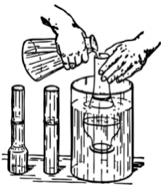
ENGL 010-601, Fall 2011
Wed 5:30-8:30 Fisher-Bennet 25
Instructor: Michelle Taransky
We often think of poetry and memoir as those forms of writing which capture the "voice" of their authors through expressing one's innermost feelings. This course works to first explain, and then reverse that model: we will learn to write creatively from the outside in. We will read the work of modern and contemporary writers who write poetry and memoir out of materials that exist outside of the self (including mathematical equations, court testimony, movies, newspaper articles, and Google searches). Students will explore individual and group writing experiments that employ collage techniques, methods of random generation, and new media technologies as a part of our active investigation of how poets and memoirists are discovering and enacting new relationships between writing and self-expression. These alternative ways of thinking about language, and subject matter will help us situate our writing acts in relation to our selves as we call attention to, and challenge, the continued consignment of one voice to one author and individualized writing practices. At semester's end, students will turn in a final project.
Required texts (available at Penn Book Center)
Revolution of the Word ed. Jerome Rothenberg
The Oulipo Compendium ed. Edited by Harry Mathews & Alastair Brotchie
Voyager by Srikanth Reddy
+Other readings as available via course website.
Course Website: http://www.writing.upenn.edu/~taransky/writingoutside.htm
all writing and reading assignments, including supplementary course readings and worksheets of your classmates work, will be posted to this site.
Also: links of interest and further reading related to our writing/thinking.
Also: links of interest and further reading related to our writing/thinking.
Procedures
Reading: As you complete your reading assignments, please take notes about what images you like, what lines you will remember, the places where you are confused, the parts you needed to read more than once. Circle what engages you— the sounds, the absurdity, a particular image or metaphor, rhythms, movements of lines or movements between subjects. Think also about how the experiment, procedure,or process that the work uses motivates, shapes, and/or constrains the piece of writing.
In-Class and At Home Writing We will write frequently in class, with additional writing assignments to be completed at home. Work will be shared regularly. Over 15 weeks of class, you are expected to complete weekly writing assignments, and turn them
Submitting Creative Work: Each week, you will turn in a hard copy of your weekly writing assignment to me in class. When we will be workshopping the following week, I will compile a packet of your work and make a PDF where the first five pieces which will be “up for workshopping.” These worksheets will be available for reading and print-out via our collaborative-course website (www.coursekit.com). It is your responsibility to print out the first five pieces and comment on them in a manner that allows you to return the piece to the author after we discuss the work.
Workshop Conduct & Structure As a supplement to weekly reading and writing assignments, we will often workshop each others pieces. I’ll let you know in class on Wednesday if we’ll be workshopping the following class. Each student will be workshopped at least once during the semester. Workshop discussion will often focus on how to critique and evaluate work that is written using formal or contextual constraints.
Grading You will be graded on the quality of your work, participation and involvement during the course.
40% Weekly writing experiments
30% Class participation
30% Final Project
30% Final Project
Enrollment in this workshop is a commitment to submit your work on time. Submitting work late, or not at all, will lower your grade. If you miss a class, you should get the reading and assignment from the course website and make up the work as soon as possible, and absolutely no later than one week after the original due date. Writing detailed commentary on your peer’s writing and actively participating in class will raise your grade. I will not put grades on your creative work at any time. I will occasionally send out emails with announcements and supplemental materials to your UPenn email address which you will be responsible for reading.
writing from the outside
Experiments in language can make 'old' ways of thinking about how to treat one another 'new' all over again --Srikanth Reddy


